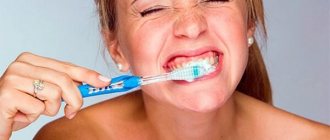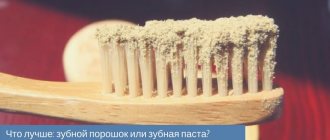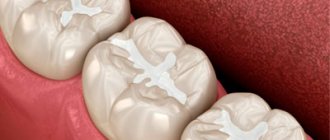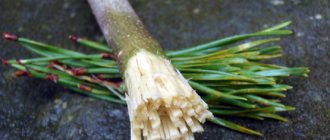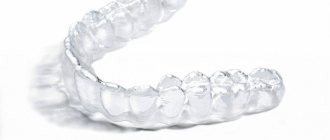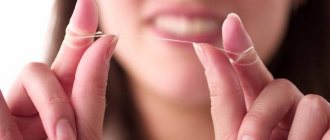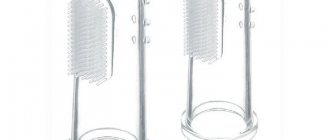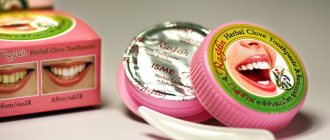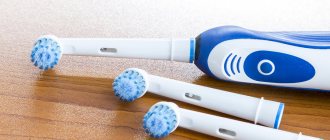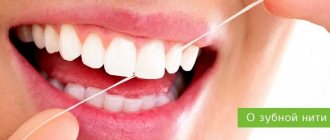In recent years, a huge variety of new toothpastes from various manufacturers have appeared on the shelves of pharmacies and stores.
They differ in composition, appearance and purpose. However, not always paste can restore the lost whiteness of teeth and help get rid of stone.
Unfairly forgotten tooth powder will come to the rescue in such a situation. Having understood the advantages and disadvantages of this substance, you can decide whether it is worth using it, and how to do it correctly, without risking harm to the enamel and gums.
How is tooth powder better than paste and what harm can it cause to teeth?
Before we had toothpaste at our disposal, a special powder was used to clean enamel from plaque. It gained popularity back in the 18th century because it did an excellent job with its immediate task, and also helped freshen breath and prevent many dental problems. Later, the paste forced the product out of the market, but today you can increasingly hear that the composition of tooth powder is much harmless, and maybe even more effective than modern oral care products. Is this really so - we will understand further in this article.
pros
- High ability to clean teeth from stains, loosen stones .
- High-quality removal of food debris and all kinds of plaque.
- Naturalness and absolute safety of the product . The presence of chemical elements is minimal, unlike toothpaste.
- There are no toxic components. Thanks to this, allergic reactions and inflammation of the mucous membrane are excluded.
- Bringing the acid-base state of the oral cavity back to normal . The registered effect is much stronger than when using a paste.
- Prevention of caries, periodontal disease, bleeding gums, protection of tooth enamel.
- Whitening in just 3 procedures thanks to chalk particles, high-quality teeth polishing.
- Massaging the gums with powder particles.
- Relief of unpleasant odor in the mouth.
- Parallel household use as a cleaner and stain remover.
- Comparatively cheap.
What we are dealing with: what is in the product
To find out what benefits and harm powder can bring to teeth, you first need to understand what it is, what it consists of, and why this method of cleansing enamel is good and useful. Essentially, this is the same paste, only in dry form and without the addition of artificial components that enhance effectiveness. Due to the fact that the powder consists of a huge number of tiny abrasive particles, it provides high-quality cleaning from plaque. The effect becomes noticeable after 2-3 applications. Today in the assortment you can find different types of dry cleaning compositions, and all of them can differ in the following parameters:
- aromatic and flavoring additives,
- additional natural ingredients,
- the purpose of the effect is to whiten teeth, heal and strengthen hard tissues, remove yellow plaque, which is especially important for a smoker.
Tooth powder is the same paste, only in dry form and without the addition of artificial components.
The product is sold in compact round boxes with a tight-fitting lid. It should be stored in a dry place protected from moisture.
From the history of occurrence
Several tens of centuries ago, a special product was already made on Earth that helped teeth become smooth and clean. They were made from shells, corals, pumice, and gypsum.
As the years passed, the composition improved. The main ingredients were eggshells, salt, and chalk. Tooth powder was first identified as a product in England in the 18th century. Chalk is the main component.
However, they began to produce it artificially in order to improve the composition. Crushed herbs, different types of oils, red and black pepper, sea salt and other components are added to it.
Features of the composition - how the product “works”
If at the beginning of its appearance the powder was prepared on the basis of ordinary chalk, today its composition has changed significantly and has been enriched with components that are useful and safe for enamel. Chalk remained the base, but now the powder is made using not just crushed, but chemically precipitated substance. The abrasive particles are smaller and less damaging to the enamel.
Thus, the presence of sea salt in the composition ensures remineralization of hard tissues and stimulates metabolic processes in the gums, baking soda allows you to lighten teeth and restore their natural whiteness, and extracts of medicinal herbs have a beneficial effect on oral health in general. Some manufacturers offer products based on white clay. It is believed to provide a more gentle cleansing without sacrificing effectiveness.
The presence of sea salt in the composition ensures remineralization of enamel
What types of dental powders are there - popular manufacturers
Before moving on to the question of how to use the product correctly, you need to familiarize yourself with the assortment presented today. Below are some really good proven products from top brands:
- Gum Gold: has an additional anti-inflammatory effect on the mucous membrane, and it contains extracts from more than a dozen different medicinal plants that prevent further growth of bacteria and help restore the natural microflora of the oral cavity. The cost of one package is about 300 rubles,
- “Mint” from “Avant”: additional components help relieve mild inflammation, carry out antibacterial treatment of surfaces, strengthen teeth, but overall the composition is standard. The cost is 50 rubles,
- “Whitening” from “Phytokosmetik”: the product does not contain dyes or flavors, is suitable for those prone to allergies, and has a pronounced whitening effect. The product costs about 70 rubles.
Recently, Japanese tooth powder for smokers from the Lion company has become very popular. The manufacturer promotes its product as a solution to the problem of nicotine plaque, but all such products have approximately the same composition with only minor differences in additional components. The conclusion suggests itself that this is just a cunning marketing ploy, and simple, and therefore cheaper, analogues will cope with the task no worse.
Advantages
If you compare powder and toothpaste, you can note a number of advantages of the first, which are as follows:
- this product can restore the natural whiteness of enamel;
- during use, the powder not only polishes the tooth surface, but also thoroughly the pores and microcracks of the crown from bacterial plaque
- has high antibacterial activity , which reduces the risk of caries;
- additional components help strengthen the enamel;
- normalizes the acid-base balance of the oral cavity;
- loosens hard deposits , which are removed over time using a regular toothbrush;
- reduces symptoms of gum tissue inflammation: bleeding, swelling, pain.
Will an ultrasonic toothbrush be beneficial? Consumer reviews.
This article provides advice on which electric toothbrush to choose.
Follow the link https://zubovv.ru/krasota-i-uxod/zubnyie-pastyi/roks-otzyivyi-vidyi-preimushhestva.html for a description of who Rox toothpaste is suitable for and at what price you can buy it.
Powder or paste - pros and cons
Opinions on this matter are divided, so it is difficult to give a definite answer to the question of which is better. Some experts are confident that tooth powder is safer and more effective, while others insist that it is completely unsuitable for daily cleaning and cannot be considered a full-fledged analogue of toothpaste. So that you can draw your own conclusion, here are some comparisons between these two products:
- dry composition is a huge amount of tiny particles that contribute to better removal of plaque. Its systematic use helps maintain the natural whiteness of your smile,
- the product in the form of a dry substance does not contain artificial components and restores the normal balance in the oral cavity, prevents the destruction of hard tissues and the development of inflammatory processes due to the active activity of bacteria,
- modern paste-like products contain additional medicinal components, the action of which is aimed at eliminating and preventing a wide variety of dental problems,
- the paste is produced in a sealed convenient tube, while bacteria can settle on the powder, and it quickly becomes unusable,
- the dry product does not provide proper antimicrobial treatment, which cannot be said about the paste,
- Cleaning powder is contraindicated for use by people with sensitive enamel. Also, it should not be used every day, since in this case the abrasive particles can injure and weaken the protective layer of the teeth,
- Sometimes pastes contain sodium lauryl sulfate or triclosan1, which are very harmful. Powders contain only natural ingredients.
Pastes are intended for daily use, and powder once every 3 days
“And I’ve been adding powder to the paste for six months now. I don’t know what kind of chemical reaction is happening there, but my teeth have clearly become several shades lighter. There is no hypersensitivity, everything is as usual. Another point: I smoke and drink coffee in the morning. So in my case, the old proven remedy really saves me. An ordinary toothpaste, and even a whitening toothpaste, did not give such an effect.”
Anatoly K., Moscow, from correspondence on the forum www.32top.ru
The key difference is that toothpastes are intended for daily use. It is better to use the dry product in courses for targeted cleansing of plaque and deposits to restore the natural whiteness of the smile. It is allowed to use tooth powder once every 3 days - this frequency is optimal for maintaining the required level of hygiene. At the same time, you need to brush your teeth with regular toothpaste as usual - twice a day.
Myths
Despite the effectiveness of the powder in removing plaque and lightening enamel, it is used by a fairly limited circle of people. This is often due to a lack of understanding of the principle of action of this substance, and unreliable data on the results of its use. The following myths associated with the use of this oral hygiene product are common in society:
- The powder destroys tooth enamel. The statement is incorrect because modern products use chemically precipitated calcium carbonate. Its small particles are not capable of harming the enamel if used in reasonable quantities.
- The effectiveness of teeth cleaning is lower than that of toothpaste due to the lack of emulsifiers and formative elements. This is not so, the powder contains all the necessary components to remove plaque, even in higher concentrations than in the paste.
- May cause allergic reactions. This assertion is unfounded. The incidence of allergies when using the powder is no higher than the number of cases of the same reaction using the paste.
Rules of application
To get results without causing damage to your dental health, you must strictly follow the instructions for use. Before you start using the product, carefully read the following recommendations:
- you should not put wet bristles into a dry composition - it is better to pour the product into a different container each time and dilute the product in it,
- you need to add a little water to the composition or mix it with a paste,
- You should use a soft brush so as not to further injure the protective layer of your teeth,
- Duration of the procedure – 3-5 minutes,
- dry product should be used no more than once every 3 days,
- At the end of the procedure, you should rinse your mouth thoroughly with water.
First, it is recommended to consult with your dentist and find out the current condition of the enamel. The doctor will tell you which remedy is best to choose in your case.
Cleaning method
- Diluting a small amount of the product to a mushy mass.
- Moisturizing your toothbrush.
- Apply the resulting mixture to the bristles.
- The actual cleaning process (no longer than 3 minutes). The brushing technique is identical to using toothpaste.
- Thoroughly rinse your mouth and brush again.
- Rinsing and drying the toothbrush.
What damage can frequent use cause?
If the product is used incorrectly, it may cause some damage to your teeth. Of the possible negative consequences, dental experts identify the following problems:
- thinning of the enamel due to frequent use of the product or due to too intensive cleaning,
- injury to open wounds on the mucous membrane, which leads to their enlargement and exacerbation of painful sensations, increasing the risk of infection,
- the likelihood of bacteria penetrating into tissues and developing various dental ailments, which is largely due to non-compliance with storage recommendations.
With frequent use of the powder, the enamel can become thinner and become sensitive.
To avoid undesirable consequences, you need to observe moderation in everything, do not use the powder too often and follow the instructions. It is also important to follow storage rules.
Reviews
Below are some customer reviews. If you have something to say, leave your feedback in the comments below the article, it will be useful to our readers.
Katerina B.
I have been using tooth powders for many years, but for the purpose of quick whitening on the eve of upcoming celebrations. And I had heard before about the dangers of their frequent use. I was encouraged by the fact that such products can also be beneficial for the mouth. Apparently it's worth using them a little more often.
Egor K.
Today there are many different powders in the world, I use them. At the same time, I alternate the use of powder and paste and noticed positive changes in the shade of my teeth. This product actually whitens better than paste. And there are much more medicinal impurities in these drugs.
How to store dry composition
Dental experts recommend storing the powder in a dry place, away from direct heat, humidity and temperature changes. The composition is sold in special plastic packaging with a sealed lid - this is the best container, but you need to make sure that moisture and dust do not get inside.
The composition should be stored in airtight packaging
How much does the product cost?
It is difficult to give a definite answer regarding how much tooth powder costs. Products with a simple composition and without additional additives will cost around 40-50 rubles per package. However, the assortment also includes more expensive products with additional strengthening, soothing or whitening effects - their price can vary between 200-300 rubles. The most expensive are foreign-made compounds, which are positioned to combat plaque in smokers. They can cost 500-600 rubles per package.
We prepare the product ourselves
The principle of preparation is quite simple, and if desired, a similar product can be made at home. In this regard, a lot of questions arise regarding how to make the product, how to dilute the components and what to add to the composition. Below is a simple and quick recipe:
- You can take medicinal clay as a basis, and other components can be essential oils, soda, sea salt,
- after this you need to mix all the dry ingredients and try to grind them thoroughly. You can use a blender or coffee grinder,
- liquid oils should be added at the end.
Tooth powder can be made at home.
The finished composition should be stored in a dry and clean container. Make sure that no dirt or moisture gets in there. Otherwise, the product will very quickly become unusable.
Benefits and potential harm
So, we are convinced that it is too early to retire tooth powder, and it can be an indispensable assistant in dental care. Here are the key advantages of using an old proven product:
- absence of artificial and toxic components,
- thorough cleaning of the enamel due to the abrasiveness of the composition,
- the ability to remove plaque and even hardened dental plaque - bulky stone will have to be removed with ultrasound,
- the property of whitening teeth, returning them to their natural shade,
- additional polishing of the enamel to give a natural shine,
- calming effect, antimicrobial treatment of mucous membranes,
- additional saturation with fluorine if present in the composition,
- normalization of the natural balance of microflora,
- prevention of caries and other pathological processes in the oral cavity,
- affordable price.
Today, powder products that are used to clean teeth have very few negative characteristics. Due to the high degree of abrasiveness, there is some danger of injuring the enamel, which can lead to its thinning and the development of hyperesthesia - hypersensitivity. In addition, the standard packaging lacks airtightness and a dispenser, which makes using the product a little more difficult. For the same reason, the powder can quickly deteriorate, especially if it is stored in inappropriate conditions. Overall, this is an effective additional measure that will improve oral hygiene and prevent many dental problems.
- Vasilyeva, L.A. Prevention and oral hygiene, 2008.
